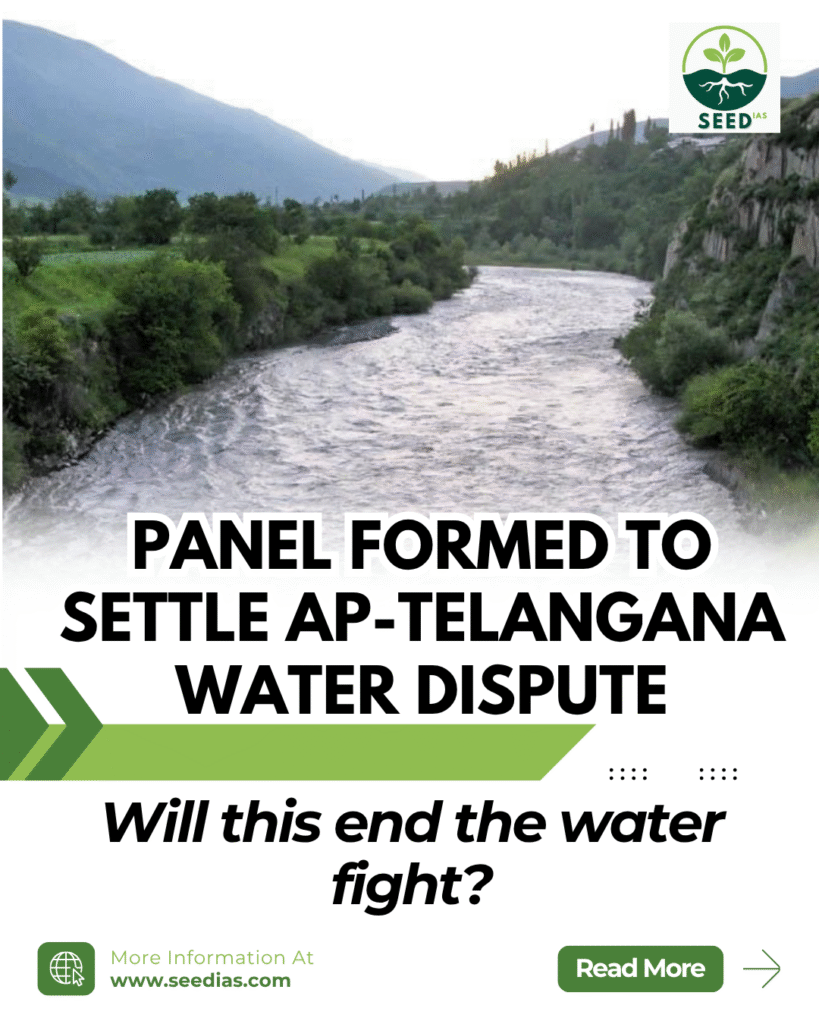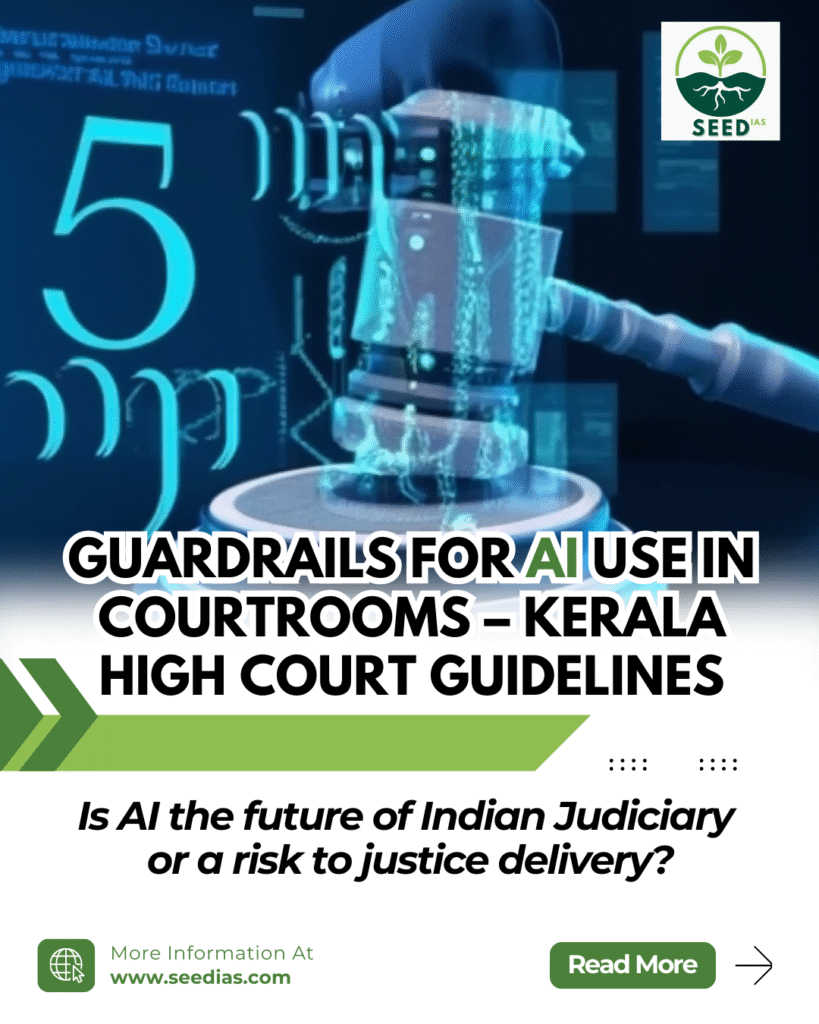Why in NEWS
The Central Government has formed a high-level committee to address the escalating dispute between Andhra Pradesh and Telangana over the Polavaram–Banakacherla Link Project (PBLP) and broader Krishna–Godavari water-sharing conflicts.
Key Terms / Concepts
| Term | Explanation |
|---|---|
| Polavaram–Banakacherla Link Project (PBLP) | A proposed inter-basin transfer project to divert 200 TMC Godavari water to Rayalaseema. |
| Apex Council | A statutory body under the AP Reorganisation Act, 2014 to manage river water issues between AP and Telangana. |
| Krishna River Management Board (KRMB) | Regulatory board for Krishna River water distribution among basin states. |
| Inter-State Water Disputes Act, 1956 | Central law enabling creation of tribunals for water disputes between states. |
| Article 262 | Constitutional provision allowing Parliament to regulate inter-state river disputes and bar court jurisdiction. |
About the Polavaram–Banakacherla Link Project
| Feature | Details |
|---|---|
| Objective | Divert 200 TMC of surplus Godavari floodwater to Rayalaseema (Krishna & Penna basins). |
| Route | Water from Polavaram Dam → Prakasam Barrage → lifted to Bollapalli Reservoir → tunnel through Nallamala forest → to Banakacherla Reservoir. |
| Purpose | Improve irrigation, drinking water supply, and livelihood security in drought-prone southern Andhra Pradesh. |
Why the Project is Disputed
| Concern | Telangana’s Objections |
|---|---|
| Violation of 2014 Act | No approval from Apex Council, KRMB, or CWC for inter-state project. |
| Surplus Water Claim | AP’s claim of 200 TMC surplus Godavari water lacks official adjudication. |
| Unauthorized Diversion | Godavari water is being diverted to Krishna without Telangana’s consent. |
| Environmental Clearance | EAC noted need for fresh review due to potential submergence in Odisha & Chhattisgarh. |
| Cooperative Federalism | Telangana accuses AP of bypassing consensus mechanisms and acting unilaterally. |
Legal and Constitutional Mechanism for Water Dispute Resolution
| Provision | Role |
|---|---|
| Article 262 | Allows Parliament to create law for adjudication and bar court jurisdiction. |
| Entry 17 (State List) | States control water for irrigation, drainage, and supply. |
| Entry 56 (Union List) | Centre can regulate inter-state rivers in national interest. |
| Inter-State Water Disputes Act, 1956 | Legal framework for tribunals; awards binding but often delayed. |
| River Boards Act, 1956 | Allows creation of river boards, though none has been constituted to date. |
Key Issues in Inter-State Water Disputes
| Issue | Impact |
|---|---|
| Delay in Tribunal Awards | Tribunals take decades (e.g., Cauvery: 17 years), lacking time-bound resolution. |
| Data Disputes | No independent body for validated, real-time flow data (e.g., Mahanadi case). |
| Court Jurisdiction Conflicts | Despite Article 262, states approach SC under Articles 131 & 136, leading to confusion. |
| Weak Enforcement | Awards require Central notification; delays make them ineffective. |
What Needs to be Done
| Measure | Benefit |
|---|---|
| Permanent Tribunal | A standing tribunal with technical experts to ensure timely decisions. |
| Basin-Wise Authority | Independent river basin body for real-time flow data and conflict prevention. |
| Amendments to Law | Fix timelines in the 1956 Act for award and implementation. |
| Cooperative Federalism | Use Inter-State Council, pre-litigation talks to build consensus and prevent escalation. |
In a nutshell
Memory Code: “WATER GAP”
Water diversion dispute,
Andhra–Telangana conflict,
Tribunal delays,
Environmental clearance pending,
River boards inactive,
Godavari-Krishna tension,
Apex Council bypassed,
Permanent solutions needed.
Prelims Practice Questions
- The Apex Council under the Andhra Pradesh Reorganisation Act, 2014 is related to:
(a) Forest conservation in Eastern Ghats
(b) River water management between AP and Telangana
(c) Electoral reforms in southern states
(d) Development of Rayalaseema region - Under which constitutional article can Parliament bar the jurisdiction of the Supreme Court in inter-state water disputes?
(a) Article 131
(b) Article 262(2)
(c) Article 246
(d) Article 280 - The Inter-State River Water Disputes Act was amended in 2002 to:
(a) Include international river disputes
(b) Create river basin authorities
(c) Fix time limits for tribunal formation and award delivery
(d) Bring water disputes under Supreme Court jurisdiction
Mains Questions
- Discuss the legal, environmental, and federal challenges involved in implementing the Polavaram–Banakacherla Link Project. (15 marks)
- What reforms are needed to resolve inter-state river water disputes effectively in India? (10 marks)
Answer Key with Explanations
| Q No. | Answer | Explanation |
|---|---|---|
| 1 | (b) | The Apex Council manages water sharing between AP and Telangana under the 2014 Act. |
| 2 | (b) | Article 262(2) empowers Parliament to exclude court jurisdiction over inter-state water disputes. |
| 3 | (c) | The 2002 amendment introduced time-bound mechanisms for setting up tribunals and giving awards. |
















